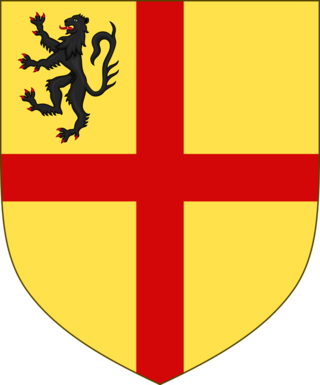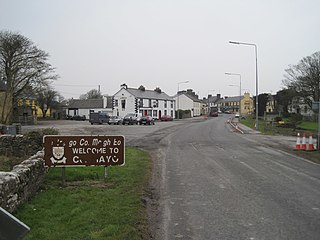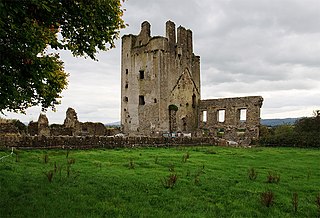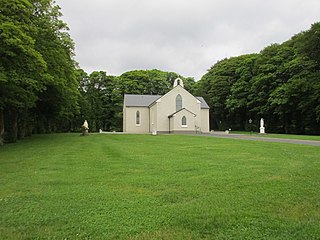The Chief of the Name, or in older English usage Captain of his Nation, is the recognised head of a family or clan. The term has sometimes been used as a title in Ireland and Scotland.
This article concerns the Gaelic nobility of Ireland from ancient to modern times. It only partly overlaps with Chiefs of the Name because it excludes Scotland and other discussion. It is one of three groups of Irish nobility, the others being those nobles descended from the Hiberno-Normans and those granted titles of nobility in the Peerage of Ireland.

Sir Uilleag (Ulick) de Burgh (Burke), 1st Clanricarde or Mac William Uachtar was an Irish chieftain and noble who was leader of one of the three factions who fought the Burke Civil War in the 1330s. By the end of the conflict he had established himself and his descendants as Clanricarde, also known as Mac William Uachtar, independent lords of Galway. He was succeeded by his son, Richard Óg Burke, 2nd Clanricarde (d.1387).

The O'Donnell dynasty were the dominant Irish clan of the kingdom of Tyrconnell, Ulster, in medieval Ireland.

Shrule is a village on the N84 road in County Mayo in Ireland. The county boundary between Mayo and County Galway follows the course of the Black River on the south side of the village.
During the Tudor conquest of Ireland (c.1540–1603), "surrender and regrant" was the legal mechanism by which Irish clans were to be converted from a power structure rooted in clan and kin loyalties, to a late-feudal system under the English legal system. The policy was an attempt to incorporate the clan chiefs into the English-controlled Kingdom of Ireland, and to guarantee their property under English common law, as distinct from the traditional Irish Brehon law system. This strategy was the primary non-violent method for Crown officials in the Dublin Castle administration to subjugate Irish clan leaders during the conquest. It was an unanticipated consequence to be required to pay fealty in currency instead of trade labor or commodities. The process of "surrender and regrant" thus created new, unfamiliar debt structures among the Irish, and these debts had social and political consequences.
Sir Edmund de Burgh was an Irish knight and ancestor of the Burke family of Clanwilliam.

John O'Donovan, from Atateemore, in the parish of Kilcolumb, County Kilkenny, and educated at Hunt's Academy, Waterford, was an Irish language scholar from Ireland.
Sir Walter Butler, 11th Earl of Ormond and 4th Earl of Ossory (1559–1633), succeeded his uncle the 10th earl, in 1614. He was called "Walter of the Beads" because he was a devout Catholic, whereas his uncle had been a Protestant. King James I intervened and awarded half of the inheritance to his uncle's Protestant daughter Elizabeth. Ormond contested the King's decision and was for that detained in the Fleet Prison from 1619 until 1625 when he submitted to the King's ruling. He then found a means to reunite the Ormond estate, by marrying his grandson James, who had been raised a Protestant, to Elizabeth's only daughter.
Events from the year 1348 in Ireland.
The Norse-Gaelic Cotter family of Ireland was associated with County Cork and ancient Cork city. The family was also associated with the Isle of Man and the Hebrides.
Peter Kelly was president of the Gaelic Athletic Association (GAA) in the late 1880s.

Seaán mac Oliver (John) Bourke, 17th Mac William Íochtar was an Irish noble who was created Baron Ardenerie (1580).
Edmond Albanach de Burgh, 1st Mac William Íochtar was an Irish chieftain and noble who established himself as the most powerful lord in Connacht west of the Shannon.

John Butler of Kilcash was an Irish landowner and soldier. A younger son of James Butler, 9th Earl of Ormond and brother of Thomas Butler, 10th Earl of Ormond, he received Kilcash Castle as appanage. He fought in the Desmond–Ormond conflict and was badly wounded in 1563, just before the Battle of Affane. He was the start-point of the Kilcash branch of the Ormonds and the father of Walter Butler, 11th Earl of Ormond.

Thomas mac Edmond Albanach de Búrca, 2nd Mac William Íochtar was an Irish chieftain and noble who was lord of Lower (North) Connacht, Ireland.

Risdeárd de Búrca, 6th Mac William Íochtar was an Irish chieftain and noble.

William "the Blind Abbot" Bourke, 20th Mac William Íochtar was an Irish chieftain and noble.

Richard "the Devils Hook" Bourke, 22nd Mac William Íochtar was an Irish chieftain and noble.

Killeenadeema is a civil parish in County Galway, Ireland. It contains most of the Derrybrien mountains, which hold the Derrybrien Wind Farm.






